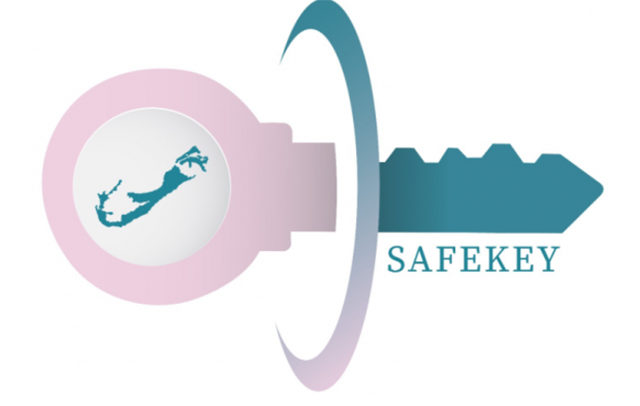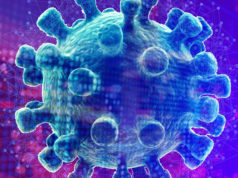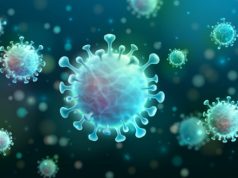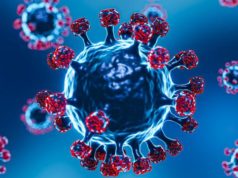“Negative test results sent by email were upgraded as of yesterday May 20th to include QR Codes on the test certificate and persons were also sent a separate SafeKey,” Premier David Burt said, adding that “the SafeKey QR codes for immunised persons will be gradually rolled out over the coming weeks.”
Speaking in the House of Assembly today [May 21], the Premier said, “SafeKey is a QR Code that will be issued to persons with a negative coronavirus test result, or to persons who are fully immunised against Covid-19 through vaccination, which is 2 weeks after an approved course of a vaccine is completed.
“SafeKey was designed with privacy in mind and will contain only the information necessary to ensure that it is being used by the person to whom it was issued. This limited information includes the user’s initials, month and day of birth, and the expiry date of the SafeKey.
“A SafeKey QR code is valid for 3 days for a negative test result, and until June 15th for fully immunised persons during the initial rollout phase. As this is a new programme these expiry periods may be adjusted while we learn how to best apply them.
“When a SafeKey is presented by the user to a business or establishment, the business can check to ensure it is authentic by going to verify.gov.bm on the web browser of a phone, and scan the QR Code using the camera. This means no special equipment is needed in order to validate that the SafeKey is authentic and not a forgery.
“Negative test results sent by email were upgraded as of yesterday May 20th to include QR Codes on the test certificate and persons were also sent a separate SafeKey. The SafeKey QR codes for immunised persons will be gradually rolled out over the coming weeks with emails containing a link that persons can click to verify their vaccination record details and be issued an upgraded vaccination certificate as well as a SafeKey.
“The initial use for SafeKey will be to allow for indoor dining to safely begin again and for churches to increase in-person attendance for corporate worship by requiring officiants and singers to be in possession of a valid SafeKey.
“The Public health regulations are currently being amended to change the existing restrictions for indoor dining and churches. Next week we will look to make further amendments to expand the use of SafeKey to gyms and other higher risk activities.
“With this new technology we can move boldly towards the future and plan for events like the Annual Cup Match Classic, knowing that there is a method to minimize the risk for fans, staff and players.”
The Premier’s full statement follows below:
“Mr. Speaker, I am pleased to provide this Honourable House and members of the public with additional details regarding the SafeKey programme announced on Tuesday.
“This initiative is part of the Government’s effort to allow for more activities and businesses to open safely with reduced risk of coronavirus exposure as we continue our work to eliminate local transmission. It is also in keeping with our efforts to upgrade our coronavirus test and Covid-19 vaccination certificates to ensure that they cannot be forged. With this technology, residents and visitors can begin to enjoy activities and events again that are so important to the cultural fabric of our island while minimising the risk of any gathering becoming a super spreader event.
“Mr. Speaker, SafeKey is a QR Code that will be issued to persons with a negative coronavirus test result, or to persons who are fully immunised against Covid-19 through vaccination, which is 2 weeks after an approved course of a vaccine is completed.
“SafeKey was designed with privacy in mind and will contain only the information necessary to ensure that it is being used by the person to whom it was issued. This limited information includes the user’s initials, month and day of birth, and the expiry date of the SafeKey.
“A SafeKey QR code is valid for 3 days for a negative test result, and until June 15th for fully immunised persons during the initial rollout phase. As this is a new programme these expiry periods may be adjusted while we learn how to best apply them.
“Mr. Speaker, when a SafeKey is presented by the user to a business or establishment, the business can check to ensure it is authentic by going to verify.gov.bm on the web browser of a phone, and scan the QR Code using the camera. This means no special equipment is needed in order to validate that the SafeKey is authentic and not a forgery. Once the Safekey is confirmed as valid, identification such as a passport or driver’s licence must also be checked to ensure the SafeKey is being used by the person to whom it was issued. This ensures that if you lose your SafeKey, it cannot be used by someone else. To further preserve your individual privacy, the SafeKey does not contain information about whether the holder tested negative or if the holder has been immunised.
“Mr Speaker, the QR codes that will now appear on Bermuda’s vaccination certificates, test results, and SafeKey are developed according to the MIT Path Check Foundation’s Paper Verifiable Credential Standard. Initially they will be verifiable by scanning them via verify.gov.bm on any mobile phone. This programme is built on open source technology, this means that any local company or local application developer can write programmes to leverage the SafeKey.
“I can confirm that the Government engaged a young Bermudian, Mr. Dejae Trott, who participated in the Government of Bermuda’s coding bootcamp in 2019, to build a mobile application to store SafeKey QR Codes on mobile phones. Additionally, Mr. Speaker, there is strong interest from other local technology & event companies who have contacted my office to learn how they can leverage the technology.
“Mr. Speaker, negative test results sent by email were upgraded as of yesterday May 20th to include QR Codes on the test certificate and persons were also sent a separate SafeKey. The SafeKey QR codes for immunised persons will be gradually rolled out over the coming weeks with emails containing a link that persons can click to verify their vaccination record details and be issued an upgraded vaccination certificate as well as a SafeKey.
“Mr. Speaker, as we look forward to the opening of a new luxury hotel this weekend, it is important that we do not forget our tourists that will be visiting Bermuda. Travellers who are not required to quarantine will receive their SafeKey QR Codes with their negative tests results. This will ensure that our visitors to the island can also utilise this new technology without needing to do anything extra.
“Mr Speaker, SafeKey is not a vaccine passport as you do not need to get a vaccine in order to be issued the QR code to enjoy activities. The initial use for SafeKey will be to allow for indoor dining to safely begin again and for churches to increase in-person attendance for corporate worship by requiring officiants and singers to be in possession of a valid SafeKey. The Public health regulations are currently being amended to change the existing restrictions for indoor dining and churches. Next week we will look to make further amendments to expand the use of SafeKey to gyms and other higher risk activities.
“Mr. Speaker, It is important to note, that though indoor dining is limited to persons with SafeKey at this time, this will not be the case forever. If Bermuda successfully meets the targets set for our move to Phase 3 of our reopening, all restaurants will be able to be open for indoor dining for all persons.
“However, Mr. Speaker, using SafeKey for indoor dining now will allow many local businesses to rehire more staff who have been laid off due to the existing restrictions, while we continue our collective work as a country to eliminate local transmission. As a country we have sacrificed and this Government wants to get as many persons back to work as quickly as possible.
“Mr. Speaker, a successful initial pilot event was carried out last weekend for an exempted gathering of people. Immunised attendees and persons who were not immunised but tested beforehand were provided a SafeKey QR Code. The technology was successfully tested, and SafeKey will be used next week for participants and attendees at the Bermuda Day Event at The National Sports Centre, as well as for participants in the Bermuda Day Half Marathon. With this new technology we can move boldly towards the future and plan for events like the Annual Cup Match Classic, knowing that there is a method to minimize the risk for fans, staff and players.
“SafeKey is flexible, and due to the fact that it can be read by any mobile phone, it allows individuals to use SafeKey for personal events such as a private party at their home where guests can be asked to share their SafeKey. This can help to minimise the risk of coronavirus exposure and can provide added comfort for important family gatherings.
“Mr. Speaker, before I close I must thank the teams who worked behind the scenes to get us to where we are today. I would like to thank the Public Officers in the Information and Digital Technology Department led by the Chief Information Officer Mr. Darren Raynor. I would like to thank the team at the Department of Communications led by Director Aderonke Bademosi Wilson for their work to support the public rollout of this initiative.
“And finally I would like to thank Mr. Denis Pitcher who has given extensive time and effort, and adapted the core technology behind this initiative at no additional cost to the Bermuda Government. While jurisdictions like the State of New York have implemented similar programmes for $2.5 million, we have implemented best in class technology in Bermuda at minimal cost to the taxpayer. This technology and the applications that support it will be built in Bermuda, supported by Bermudians, and will yield many benefits for our summer tourism season.
“Any resident, visitor, or app developer who wants to learn more about SafeKey can visit the website: gov.bm/SafeKey to learn more.
“Mr. Speaker, as we utilise this newest tool in our arsenal, we can take confidence from how well Bermuda has applied cutting edge technology throughout the pandemic. The WeHealth app has helped to notify persons of potential exposure and has helped to manage outbreaks. Our travel authorisation and testing system has earned praise from residents and visitors alike. And now we will use technology again through the SafeKey programme to stay one step ahead of the coronavirus to support businesses, and continue our drive to get Bermudians back to work.
“SafeKey has the potential to be a useful tool to help continue our positive trend towards eliminating local transmission, while reopening our economy as this Government moves Bermuda beyond the pandemic. Thank You Mr. Speaker.”











